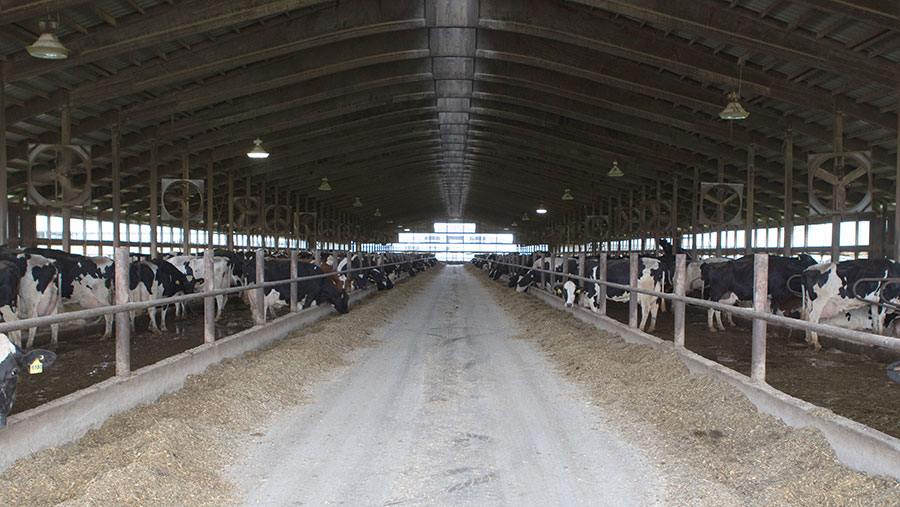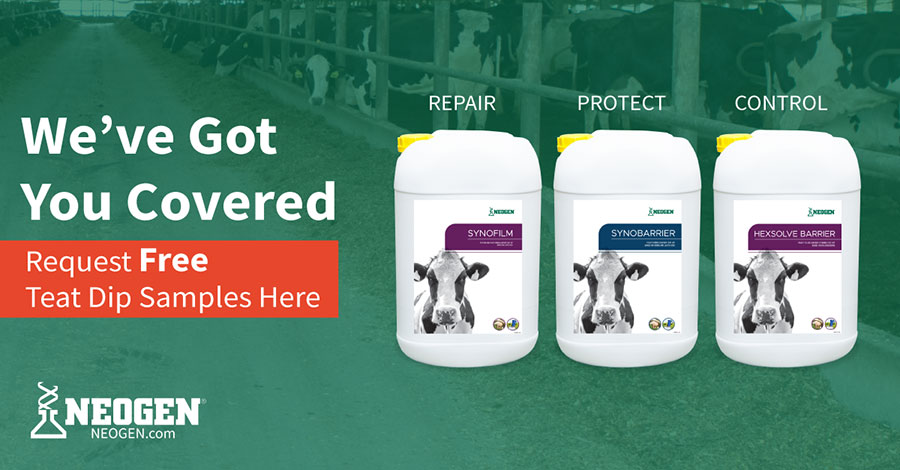Advertiser content
5-point strategy to keep your herd’s teats healthy in winter
Provided by
Neogen develops and markets products dedicated to food and animal safety. Neogen’s Animal Safety Division is a leader in the development of animal genomics, along with the manufacturing and distribution of a variety of animal healthcare products, including diagnostics, pharmaceuticals, veterinary instruments, wound care, hygiene products and aquaculture.
 © Neogen
© Neogen Winter brings cold, harsh weather with low humidity – the perfect conditions for teat-skin damage including chapping, and hyperkeratosis; the most common teat-skin and teat-end problems. During these cold months, teat-skin damage is a major factor predisposing cows to mastitis.
By addressing winter challenges, dairy farm owners can minimize teat-skin damage and the resulting losses from infected cows, impacting productivity and milk quality.
The key to achieving quality milk includes adopting proper milking procedures and udder care. Teat dipping is an important part of the milking procedure and preventive mastitis plan.
Listed below are some simple strategies to keep your herd healthy and producing high-quality milk throughout winter.
Keep teat skin well-conditioned
Teat skin thickness changes during extreme weather conditions; it is therefore important to condition it in order to keep it well hydrated and soft during the winter season.
Using a lactic teat dip with a high emollient content acid helps exfoliation of dead skin, this can reduce hyperkeratosis and, makes the teat ends smoother. NEOGEN® SYNOFILM, a lactic acid-based low drip formulation that contains emollients, which aids in recovery and prevention of cracked or chapped teats.
Smoother teats are able to harbour less bacteria and are easier to clean. An early start in preconditioning teats helps prepare the teat for the harsh winter conditions before it hits whilst reducing the risk of intramammary infections.
Winter teat dip
Post dipping is just as important in winter as during summer to control mastitis. Selecting the right teat dip which is formulated for winter condition is crucial. As discussed above, a high emollient teat dip helps protect, heal, and soften teat skin during harsh weather.
A good post-winter teat dip should also have excellent biocidal activity against mastitis-causing bacteria. NEOGEN’s SYNOBARRIER, is a ready to use Iodine and Lactic acid-based post milking teat dip, which is an extremely effective broad-spectrum disinfectant, fit for winter use.
The blend of lactic acid with multiple emollients helps keep teat skin well-conditioned whilst the presence of iodine makes it highly effective for farms with high incidence of mastitis. For farms with good teat condition but high mastitis incidence, a chlorhexidine-based teat dip such as Hexsolve Barrier, from NEOGEN is a good solution.
Use of post milking teat dip which is a good balance of emollient and biocidal action as soon as winter starts, helps manage herd health conditions at farm.
Properly maintained milking equipment
Milking equipment must be regularly serviced and maintained all year round. However, extra attention must be paid to the service before the beginning of the winter months.
If the milking machine isn’t working properly, it can damage blood vessels in the udder and cause hyperkeratosis at the teat end causing more stress and pain to cows.
Ensuring that current equipment settings are optimal to the cows’ current milk production is critical. Settings that are too low or too high than the optimum for vacuum and pulsation will increase teat stress and aggravate poor teat-end condition resulting in hyperkeratosis at the teat end.
The milking machine also comes regularly in contact with the cows’ udders increasing the risk of spreading mastitis-causing bacteria from one cow to the other, hence it should be thoroughly cleaned using good cluster cleaners and disinfectants.
A highly effective bactericide like PERAGUARD or PERAGUARD PLUS from NEOGEN, which are powerful non-rinse disinfectants, which can help you reduce the risk of cross contamination of clusters by mastitis-causing bacteria. This helps in maintaining the udder health and reduces the need for veterinary intervention.
Follow proper milking procedures
Proper milking procedures are crucial to harvest high-quality milk safely and quickly. Your milking procedure should allow for pre milking teat dipping, clean teats, proper stimulation, milk let-down time (90 to 120 seconds), proper unit attachment and alignment.
It is often best to treat 5-6 cows with pre-dip and then return to the first one before wiping off. This allows sufficient contact time to kill bacteria.
After allowing for a suitable contact time, the pre dipping solution should be cleaned off using a clean wipe. This can be a paper or a cloth towel. This is part of the stimulation process.
Remember, Oxytocin release takes 90s from time of first teat stimulation so do not rush to put on the cluster. One of the most powerful milk let-down stimuli is fore stripping each teat which also allows you to check for any visual symptoms of mastitis.
Better housing environment
Housed dairy cows and calves encounter a wide range of environmental challenges. Managing an optimum housing environment minimizes the impact of winter weather on teat health.
Bedding is a key component to prevent environmental mastitis, but it is especially important in winter to keep bedding dry to prevent teat infections and cold. This might mean more frequent bedding change and using less recycled bedding in the winter.
Be sure to monitor stall usage; a decline may indicate frozen bedding or clumps of frozen bedding in the stall.
Teats when exposed to freezing wind can develop frostbite or get chapped and this is very stressful for cows. Wind blocks can help reduce wind speeds and prevent teat skin deterioration.
Cow housing that keeps cows free from wind and cold can have a significantly beneficial effect on teat skin condition.
Attention to these five points will restrict the effect of harsh, cold weather and help you manage healthy teat condition all through winter.

